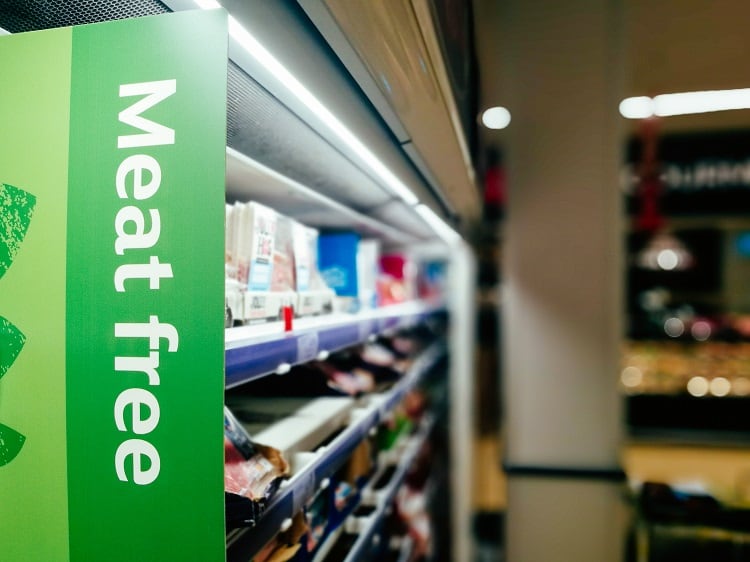A few years ago, around 40% of consumers in Europe said they planned to eat fewer meat products, while 30% said they planned to cut back on dairy. Today, consumers are still interested in doing both, but to a lesser degree.
What’s driving these consumption behaviours, and why – in some cases – might intention to cut meat and dairy be waning?
Fewer consumers identify as flexitarian, and fewer plan to cut meat intake
In 2021, a pan-European survey across 10 countries revealed the ‘flexitarian’ trend was alive and kicking. Of the 7,500 people surveyed as part of the EU-funded Smart Protein project, 30% identified as flexitarian eaters.
Just this week, a new, separate study was published as part of the HealthFerm project. Findings revealed that fewer people identify as flexitarian, with just 16% of the 7,900 consumers surveyed across nine European countries seeing themselves this way.
Interestingly, 27% of consumers eat meat less than three times per month, but don’t necessarily identify themselves as flexitarians.
It’s not just the number of people identifying as flexitarians that’s dropping, it’s also intention to reduce meat intake. The 2021 survey indicated that 40% of consumers planned to reduce meat consumption in the following six months, whereas in the 2024 HealthFerm findings, just 27.5% said they planned to consume less meat.
Dietary preferences explained
- Omnivore: I frequently eat meat such as beef, pork, chicken, turkey, fish and/or shellfish
- Flexitarian: I sometimes eat meat, but I am trying to reduce my meat consumption and often choose plant-based foods instead
- Pescatarian: I eat fish and/or shellfish, but no other types of meat
- Vegetarian: I don’t eat meat and fish of any kind, but I do eat eggs and/or dairy products
- Vegan: I don’t eat meat, fish, eggs, dairy products, or any other animal-based ingredients
Dairy consumption appears even harder to change. The most recent findings revealed almost 77% of respondents plan to consume ‘about the same’ amount of dairy over the next six months. Just 13% plan to consume less.
This is in stark contrast to the 2021 Smart Protein project, which indicated more than twice as many (close to 30%) planned to reduce their dairy consumption.
Consumers don’t want to consume ‘a lot less’ meat or dairy
Although the two EU-funded studies are separate, Armando Perez-Cueto – who these days heads up Umea University’s Research Group on Sustainable Food Transitions – worked on both.
I'm confused, which survey is which?
In 2021, the Smart Protein project published a survey investigating what consumers want from plant-based foods in Europe. A total of 7,500 people were surveyed across Austria, Denmark, France, Germany, Italy, the Netherlands, Poland, Romania, Spain, and the UK.
Just this week, results from the first wave of a new, separate survey was published as part of the HealthFerm project. 7,900 people were surveyed from Belgium, Finland, France, Germany, Italy, Romania, and Switzerland.
The key similarity identified between the two studies is that omnivore and flexitarian respondents are mainly willing to reduce ‘slightly less’, he told FoodNavigator. But those willing to significantly reduce meat consumption are ‘rather few’ in this most recent, first wave of HealthFerm’s survey.
As to why intention to reduce meat and dairy intake significantly is waning, Perez-Cueto can only guess. “One can speculate that we are reaching a kind of plateau in the desire to reduce animal sourced foods among omnivores and flexitarians, as eating less meat is becoming more normal, thus people might not perceive a need to further reduce.”
To know for certain, the researchers would need to ‘dig a bit further’, he told this publication, but his hypothesis is backed up by findings that a good percentage of consumers (40%) reported having changed their dietary lifestyle. Among those who had made a change, 69% switched from omnivore to a diet containing fewer or no animal products.
With 75% of all HealthFerm survey respondents identifying as omnivores, it’s suggested that 25% were either currently intentionally reducing, or had removed, animal products from their diets to varying degrees.
As to the reasons for changing, personal health is the primary driver, but environmental sustainability also matters to consumers.
Which country has the most flexitarians?
The HealthFerm project surveyed 7812 consumers across nine countries, including Belgium, Denmark, Finland, France, Germany, Italy, Romania, and Switzerland.
Germany was judged to have the highest percentage of flexitarians, at 30%. Between 18-20% respondents in France, Switzerland and Belgium identified as flexitarian, which then dropped to 14% in Romania and 6% in Finland.
Education level, socioeconomic status, and age associated with diet
What the survey could confirm is that that lower consumption of animal products is associated with higher education level and socioeconomic status.
Two percent of respondents with an undergraduate degree identified as vegan, which is twice that of those who finished education at secondary school. Consumers holding a graduate degree were nearly twice as likely to identify as vegan, compared to those with an undergraduate degree only.
From a socioeconomic status perspective, respondents who described their financial situation as ‘extremely easy’ were more than twice as likely to identify as vegetarian or vegan than those who described their financial situation as ‘neither easy nor difficult’.
Age is also linked to meat consumption behaviour. Respondents identifying as vegetarian or vegan represented 10% of the 25-43 age group, with the figure decreasing to just 3% for those aged 65 years and over.
Interested in other HealthFerm findings?

Conventional wisdom would suggest if a product is priced lower, consumers would be more willing to purchase it. But when it comes to plant-based, Europeans are bucking the trend.
Find out more here: Consumers don’t want cheap plant-based meat and dairy




